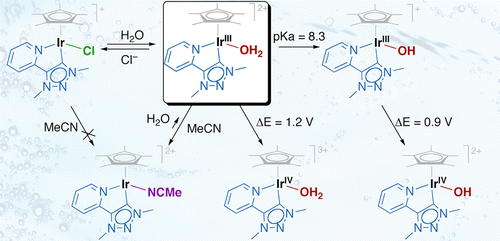Iridium(III) complexes containing a bidentate spectator ligand have emerged as powerful catalyst precursors for water oxidation. Here we investigate the initial steps of the transformation at the iridium center when using complex [IrCp*(pyr-trz)Cl] 1 (Cp* = pentamethylcyclopentadienyl, pyr-trz = 4-(2-pyridyl)-1,2,3-triazol-5-ylidene), a potent water oxidation catalyst precursor. Ligand exchange with water is facile and is reversed in the presence of chloride ions, while MeCN substitution is effective only from the corresponding aqua complex. A pKa of 8.3 for the aqua complex was determined, which is in agreement with strong electron donation from the triazolylidene ligand that is comparable to aryl anions. Evaluation of the pH-dependent oxidation process in aqueous media reveals two regimes (pH 4–8.5 and above pH 10.5) where proton-coupled electron transfer processes occur. These investigations will help to further optimize water oxidation catalysts and indicate that MeCN as a cosolvent has adverse effects for initiating water coordination in the oxidation process.
